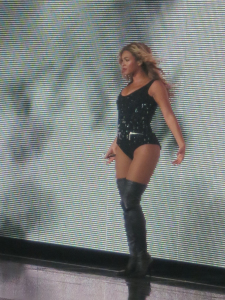“In Search of a Culture That Isn’t Appropriate/d:or, How to Pretend You’ve Invented the Opposable Thumb with a Straight Face”
Full Talk
A few weeks ago an essay called “Dear White Gays: Stop Stealing Black Female Culture” appeared on the website of Time magazine and went viral. The sentiment has caused some angry (and some epically stupid) responses from a variety of sectors.1 I want to try tonight to think through some of this stickiness about cultural appropriation. Before I do that, I want to note that it would be impossible for anyone to respond to the entire stream of nonsense that passes for knowledge or cultural critique on the internet, still less possible to respond to it in a knowledgeable or sensitive way. Although let me just say that recently the performance artist Ann Coulter wrote a bizarre, nationalist anti-World-Cup column in which she said that “what sets man apart from the lesser beasts, besides a soul, is that we have opposable thumbs” and I did want to comment on the absurdity of this.2 I don’t have anything to say about souls, but as anyone who has spent any time reading Georges Bataille – or anyone who has eroticized feet as much as I have – knows, what separates us greater beasts from the lesser beasts is the big toe.3 Apes simply don’t have them: in fact, they have more opposable thumbs than we do. In any case, football uses the big toe liberally, and Ann Coulter ought to read more Bataille.
So: cultural appropriation. Two stories. When I was small, nine or ten years old perhaps, I learned that my parents, who are both white people, were concerned that I was spending too much time with my older sister LaTonya, who is black, and that I had started acting “too black”. LaTonya – who hilariously used to call herself The Root, a nickname she invented – told me that my parents thought that I was acting blacker than she was and that she needed to calm down her influence on me. I, of course, had no idea that I was doing anything, that I was performing a particular style of any kind or, indeed, that that my parents would racialize that performance. I was a kid. And I thought my big sister was the cleverest, coolest, most hilarious person in the world. What I think fascinating about this moment in my life is that, although my mother doesn’t remember it this way, I am positive that what my parents saw in me and what they perceived as threatening was neither blackness nor femininity per se but what blackness and femininity meant to them. For my parents, my performance of what they perceived to be a combination of blackness and femininity meant that I was going to grow into a gay teen who would later become a gay adult. (They were mostly wrong about the teen part, I guess, and mostly right about the adult part.) But was I being black? Was I being gay? Was I being feminine? Female? Queer? I know I was not thinking about gay culture at all, because I didn’t know a thing about it, and spent the majority of my time reading the story of Esther and Haman in the Old Testament. In any case, I hesitate to answer yes to any of those questions, mostly because I was a child and I can’t remember very well what I thought I was doing or what I wanted to be. All I remember is that one of the disciplinary systems in my life named my nine-year-old style as “too black”, and that, 25 years later, I now perceive this naming as racialized code for “too gay”.
Second story. Two years ago at my institution a straight white woman directed a production of Angels in America Part One and I sort of hated it.4 I was really frustrated by what I perceived as “straight boys up on stage going through their gay paces”. So I blogged about it. “They’re up there on the stage playing gay characters,” I complained, “which is (I am sure they think) very admirable and brave and all, but the more I watched the more wrong the whole thing felt.” I further complained – and I am going to keep quoting here – “This isn’t theirs, I thought. […] They don’t understand it because it isn’t for them, or rather, it isn’t about them. This is not theirs.” Still quoting: “The implication here is, of course, that Angels in America is somehow mine, and […] the more I think about it, the more true I think that is5 – as laughable as that sounds.”6 My friend Brian Herrera’s response to this post was “Are you becoming something of a cultural separatist in your post-PhD years?”. I didn’t take Brian’s bait then, so I’m taking it now, and I (re)tell this story mainly because I sympathize with the feeling (apparently in the exact same words as the author of the Time piece) that I am a part of a culture and I don’t like when that culture is represented in what I perceive as a hollowed-out way.
But now two more thoughts about this: It seems to me that in the two stories I’m sharing from my life, one is about style and the other is about a specific cultural object. (Both stories are, of course, about performance.) It isn’t that I think co-opting a style is any more or less pernicious than co-opting a cultural object, but I think the two things are different. Ought we to call twerking a cultural object or a cultural style? Is a reference to Come Back, Little Sheba or Mommie Dearest an object or a style? Is my way of saying “Ain’t that some shit” an object or a style? I will agree that if I perform any of these things – to twerk, to reference Come Back, Little Sheba – I locate myself within what we might call culture, but I am not sure with what culture I necessarily identify as I perform each of these. I do know that I didn’t invent any of them any more than Ann Coulter invented the opposable thumb. If I use any of these gestures I place myself within something that existed before I came along. And not just that! I might give a word or a gesture a flair I would call my own, but I also know that I can never fully possess a gesture or a word. If it is mine, it is so only for the briefest of instances, before others start reading into it and onto me – like my parents read blackness/gayness/femininity, where I thought I was just being me.
My final thought has to do with the way “culture” is made. I’ve been reading a lot about early twentieth-century black Communism these days, and one of the debates among the poets of the 1930s and ’40s is what “authentic” black culture looked like. The differences between the work of Sterling Brown and Langston Hughes illustrate this beautifully. For Brown, southern, rural black culture was the “real” black culture – the folk. Northern urban culture was a culture co-opted by white people, corrupted by capital, stultified by industry. Some scholars have argued that Brown’s poetry dealing with “the folk” is just as inauthentic as urban jazz, and they are probably right. But more importantly, what I hear in the work of Sterling Brown – and I don’t hear in the current discussions of black female culture vs. white gay male culture, is a desire to escape mass culture. I find Brown’s poetry beautiful, and if he failed to access an “authentic blackness”, he was attempting, nonetheless, to move away from the cultural forms that he felt were being forced upon him by the producers of mass culture. Brown understood that there is no authenticity in mass cultural forms, and so he tried to get back to something authentic.
Now, it is possible that there is no authentic culture anywhere, and – as some have argued – that all cultural forms are examples of hybridity and the encounter with an other. But here’s what I think I know: Beyoncé and Orange Is the New Black and Scandal and Frank Ocean and even RuPaul’s Drag Race are products of USAmerican mass culture. And we may enjoy any and all of those cultural products, but none of them is ours, none of them is oppositional, and for any of us to lay claim to any of them means that we have begun to buy into the delusion that mass culture is a culture that we produced ourselves, and that those cultural products express us when, as we ought to know by now, mass culture is chiefly disciplinary; it doesn’t express a style of our own, it tells us how we ought to style ourselves.
Notes:
1. Sierra Mannie. For stupid responses see Steve Freiss. See also: Ali Barthwell, Anthony Michael D’Agostino, Daniel D’Addario, Madison Alexander Moore.
2. Ann Coulter.
3. Georges Bataille, “The Big Toe,” trans. Allan Stoekl, Visions of Excess: Selected Writings, 1927-1939, (University of Minnesota Press, 1985).
4. Said in the manner of David Alan Grier and Damon Wayans from In Living Color. And if you don’t know what this is, educate yourself here.
5. Impossible to say without giggling.
6. Aaron C. Thomas.



